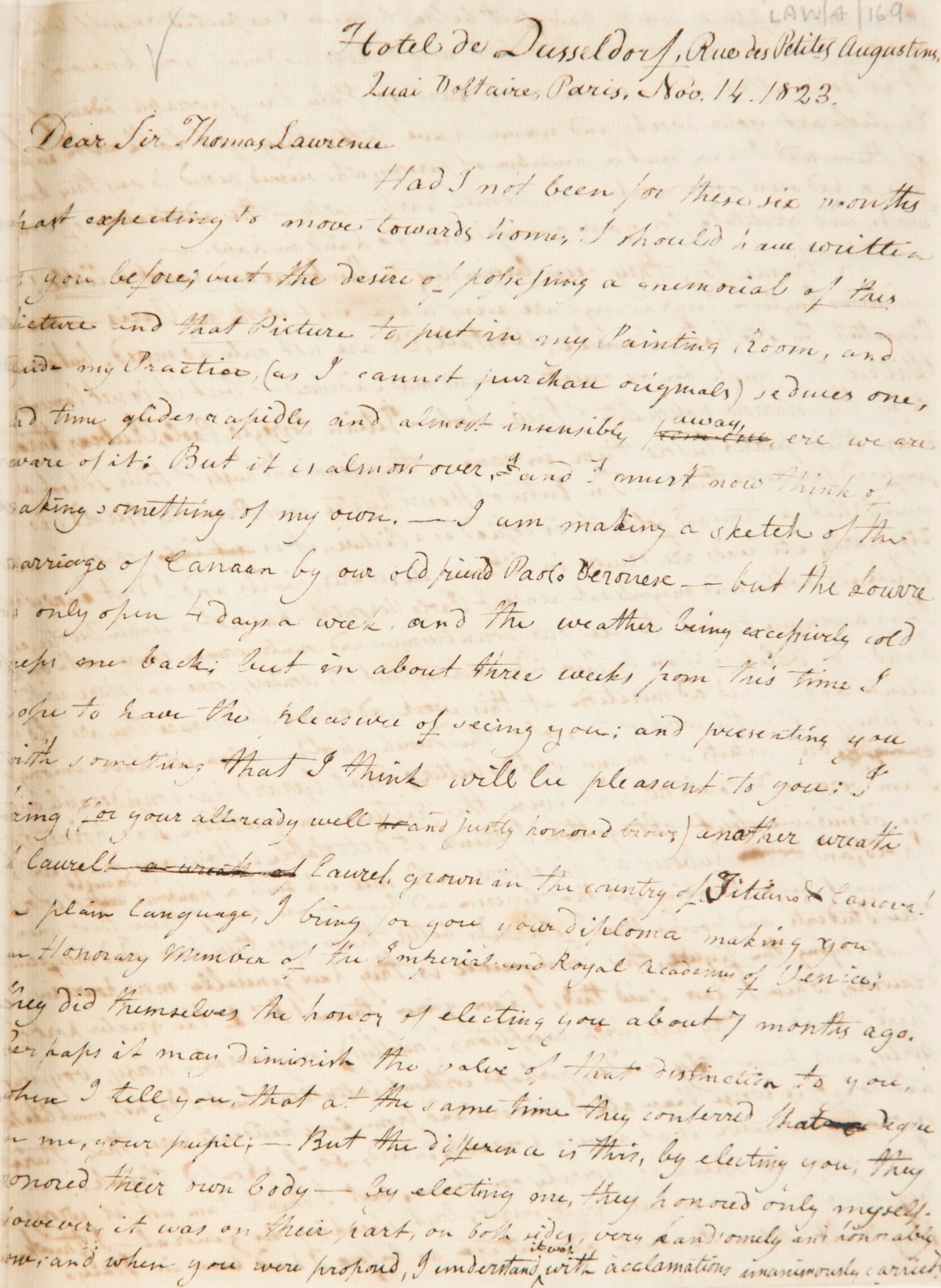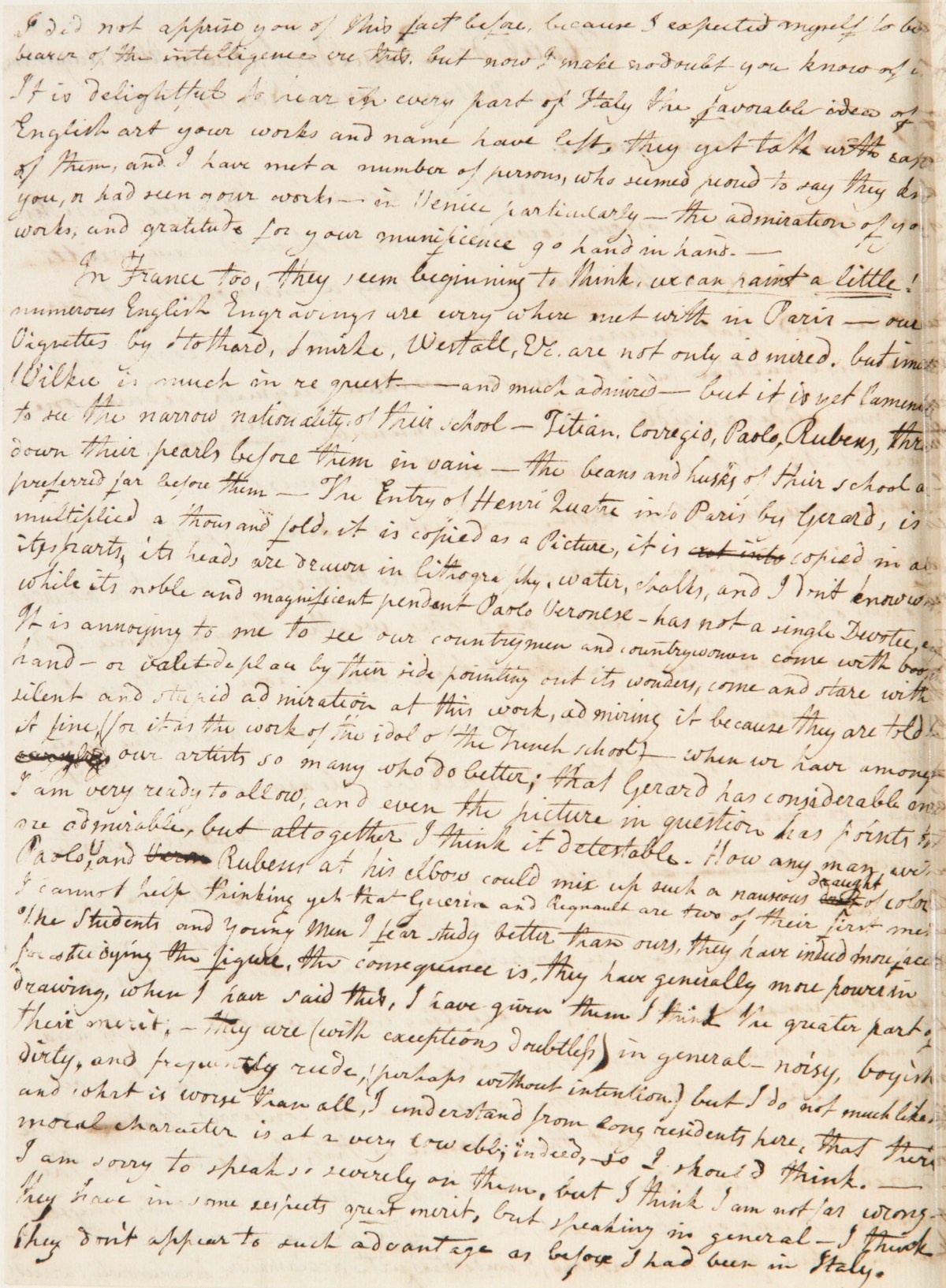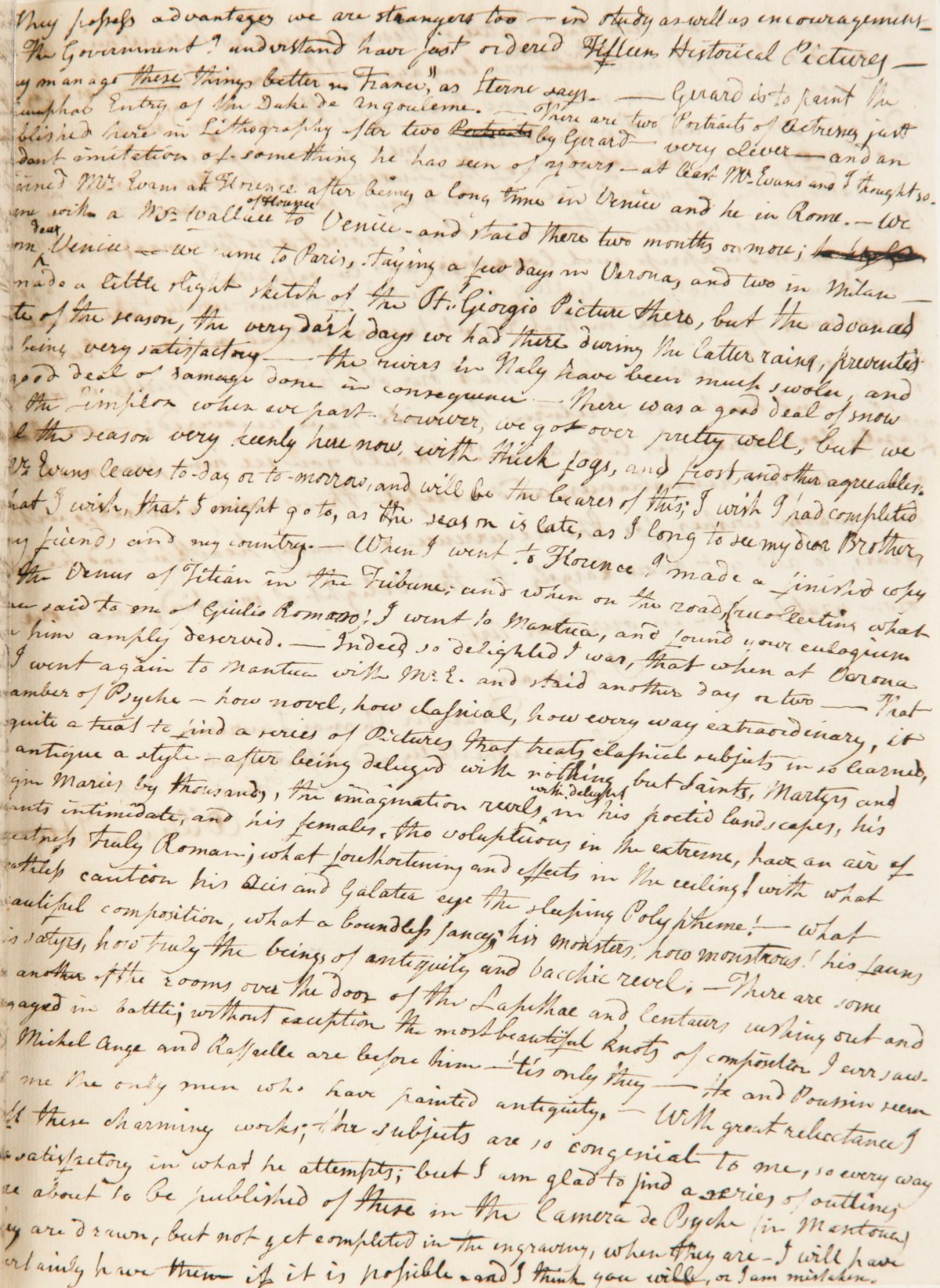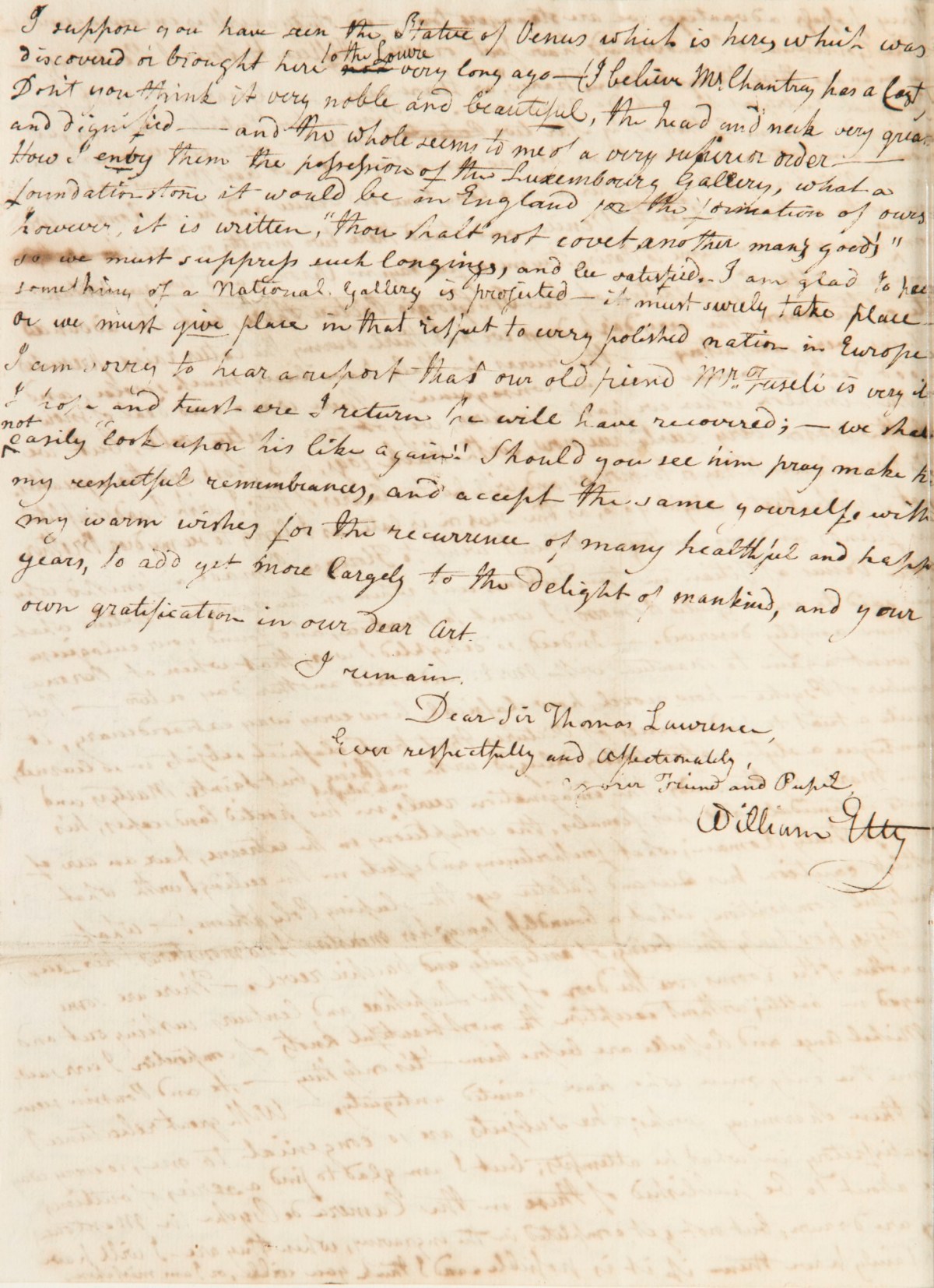
William Etty, Hotel de Dusseldorf, Rue des Petits Augustines, Quai Voltaire, Paris, to Sir Thomas Lawrence
© Photo: Royal Academy of Arts, London.
This image is not available to download. To licence this image for commercial purposes, contact our Picture Library at picturelibrary@royalacademy.org.uk
Hotel de Dusseldorf, Rue des Petites Augustins
Quai de Voltaire, Paris, Nov. 14. 1823.
Dear Sir Thomas Lawrence
Had I not been for these six months
past expecting to move towards home, I should have written
to you before; but the desire of possessing a memorial of this
Picture and that Picture to put in my Painting Room, and
guide my Practice, (as I cannot purchase originals) seduces one,
and time glides rapidly and almost insensibly from one away, ere we are
aware of it: But it is almost over, and I must now think of
making something of my own. _ I am making a sketch of the
marriage of Canaan by our old friend Paolo Veronese _ but the Louvre
is only open 4 days a week, and the weather being excessively cold
keeps one back; but in about three weeks from this time I
hope to have the pleasure of seeing you; and presenting you
with something that I think will be pleasant to you: I
bring (for your allready well and justly honored brows) another wreath
of laurel! a wreath of laurel, grown in the country of Titiano & Canova!
In plain language, I bring for you your diploma making you
an Honorary Member of the Imperial and Royal Academy of Venice;
They did themselves the honor of electing you about 7 months ago.
Perhaps it may diminish the value of that distinction to you,
when I tell you that at the same time they conferred that degree
on me, your pupil; _ But the difference is this, by electing you, they
honored their own body _ by electing me, they honored only myself.
However, it was on their part, on both sides, very handsomely and honorably
done; and when you were proposed, I understand it was with acclamation unanimously carried!

William Etty, Hotel de Dusseldorf, Rue des Petits Augustines, Quai Voltaire, Paris, to Sir Thomas Lawrence
© Photo: Royal Academy of Arts, London.
This image is not available to download. To licence this image for commercial purposes, contact our Picture Library at picturelibrary@royalacademy.org.uk
I did not apprise you of this fact before, because I expected myself to be the
bearer of the intelligence ere this, but now I make no doubt you know of it.
It is delightful to hear in every part of Italy the favorable idea of
English art your works and name have left, they yet talk with rapture
of them, and I have met a number of persons, who seemed proud to say they knew
you, or had seen your works _ in Venice particularly _ the admiration of your
works, and gratitude for your munificence go hand in hand. _
In France too, they seem beginning to think, we can paint a little!
numerous English Engravings are every where met with in Paris _ our
Vignettes by Stothard, Smirke, Westall, &c are not only admired, but imitated
Wilkie is much in request _ and much admired _ but it is yet lamentable
to see the narrow nationality of their school _ Titian, Corregio, Paolo, Rubens, throw
down their pearls before them in vain _ the beans and husks of their school are
preferred far before them _ The Entry of Henri Quatre into Paris by Gerard, is
multiplied a thousand fold, it is copied as a Picture, it is cut into copied in all
its parts, its heads are drawn in lithography, water, chalks, and I don’t know what_
while its noble and magnificent pendant Paolo Veronese _ has not a single Devotee, except me
It is annoying to me to see our countrymen and countrywomen come with book in
hand _ or valet de place by their side pointing out its wonders, come and stare with
silent and stupid admiration at this work, admiring it because they are told it
is fine, (for it is the work of the idol of the French school) _ when we have amongst
our artists so many who do better; that Gerard has considerable merit
I am very ready to allow; and even the picture in question has points that
are admirable, but altogether I think it detestable. How any man with
Paolo V and Vero Rubens at his elbow could mix up such a nauseous draft draught of color!_
I cannot help thinking yet that Guerin and Regnault are two of their first men.
The Students and Young Men I fear study better than ours, they have indeed more facilities
for studying the figure, the consequence is, they have generally more power in
drawing, when I have said this, I have given them I think the greater part of
their merit; _ they are (with exceptions doubtless) in general noisy, boyish,
dirty, and frequently rude, (perhaps without intention) but I do not much like them.
and what is worse than all, I understand from long residents here, that their
moral character is at a very low ebb; indeed, so I should think._
I am sorry to speak so severely on them, but I think I am not far wrong _
they have in some respects great merit, but speaking in general _ I think
they don’t appear to such advantage as before I had been in Italy.

William Etty, Hotel de Dusseldorf, Rue des Petits Augustines, Quai Voltaire, Paris, to Sir Thomas Lawrence
© Photo: Royal Academy of Arts, London.
This image is not available to download. To licence this image for commercial purposes, contact our Picture Library at picturelibrary@royalacademy.org.uk
They possess advantages we are strangers too _ in study as well as encouragement _
_ The Government I understand have just ordered Fifteen Historical Pictures _
“They manage these things better in France,” as Sterne says. _ Gerard is to paint the
Triumphal Entry of the Duke de Angouleme. _ There are two Portraits of Actresses just
published here in Lithography after two Portraits by Gerard _ very clever _ and an
evident imitation of something he has seen of yours _ at least M.r Evans and I thought so.
I joined M.r Evans in Florence after being a long time in Venice and he in Rome. _ We
came with a M.r Wallace of Florence to Venice and staid there two months or more; he travelled
from dear Venice _ we came to Paris, staying a few days in Verona, and two in Milan_
I made a little slight sketch of the St.. Giorgio Picture there, but the advanced
state of the season, the very dark days we had there during the latter rains, prevented
its being very satisfactory _ the rivers in Italy have been much swolen, and
a good deal of damage done in consequence _ there was a good deal of snow
on the Simplon when we past, however we got over pretty well, but we
feel the season very keenly here now, with thick fogs, and frost, and other agreeables.
M.r Evans leaves to-day or to-morrow, and will be the bearer of this; I wish I had completed
what I wish, that I might go to, as the season is late, as I long to see my dear Brothers
my friends and my country. _ When I went to Florence I made a finished copy
of the Venus of Titian in the Tribune; and when on the road, (recollecting what
you said to me of Giulio Romano) I went to Mantua, and found your eulogium
on him amply deserved. _ Indeed so delighted I was, that when at Verona
I went again to Mantua with M.r E. and staid another day or two _ That
Chamber of Psyche _ how novel, how classical, how every way extraordinary, it
is quite a trial to find a series of Pictures that treats classical subjects in so learned
so antique a style _ after being delayed with nothing but Saints, Martyrs and
Virgin Maries by the thousands, the imagination revels with delight in his poetic landscapes, his
giants intimidate, and his females, tho voluptuous in the extreme, have an air of
greatness truly Roman; what foreshortening and effects in the ceiling! with what
breathless caution his Acis and Galatea eye the sleeping Polypheme! _ what
beautiful composition, what a boundless fancy; his monsters, how monstrous! his fauns
his satyrs, how truly the beings of antiquity and bacchic revel. _ There are some
in another of the rooms over the door of the Lapithae and Centaurs rushing out and
if Michel Ange and Raffaelle are before him _’tis only they _ He and Poussin seem
to me the only men who have painted antiquity. _ With great reluctance I
left these charming works; the subjects are so congenial to me, so every way
satisfactory in what he attempts; but I am glad to find a series of outlines
are about to be published of these in the Camera de Psyche (in Mantua)
They are drawn, but not yet completed in the engraving, when they are _ I will have
certainly have them if it is possible and I think you will, or I am mistaken.

William Etty, Hotel de Dusseldorf, Rue des Petits Augustines, Quai Voltaire, Paris, to Sir Thomas Lawrence
© Photo: Royal Academy of Arts, London.
This image is not available to download. To licence this image for commercial purposes, contact our Picture Library at picturelibrary@royalacademy.org.uk
I suppose you have seen the Statue of Venus which is here, which was
discovered or brought here to the Louvre not very long ago _ (I believe M.r Chantrey has a Cast)
Don’t you think it very noble and beautiful, the head and neck very great _
and dignified _ and the whole seems to me of a very superior order __
How I envy them the possession of the Luxembourg Gallery, what a
foundation stone it would be in England for the formation of ours.
however, it is written “thou shalt not covet another man’s goods”
so we must suppress such longings, and be satisfied. _ I am glad to hear
something of a National Galley is projected _ it must surely take place _
or we must give place in that respect to every polished nation in Europe.
I am very sorry to hear a report that our old friend M.r Fuseli is very ill
I hope and trust ere I return he will have recovered; _ we shall
not easily look upon his like again! Should you see him pray make him
my respectful remembrances, and accept the same yourself. with
my warm wishes for the recurrence of many healthful and happy
years, to add yet more largely to the delight of mankind, and your
own gratification in our dear Art.
I remain,
Dear Sir Thomas Lawrence,
Ever respectfully and affectionately,
your Friend and Pupil
William Etty
William Etty, Hotel de Dusseldorf, Rue des Petits Augustines, Quai Voltaire, Paris, to Sir Thomas Lawrence
RA Collection: Archive
Archive context
Reference code
LAW/4/169
Title
William Etty, Hotel de Dusseldorf, Rue des Petits Augustines, Quai Voltaire, Paris, to Sir Thomas Lawrence
Date
14 Nov 1823
Level
Item